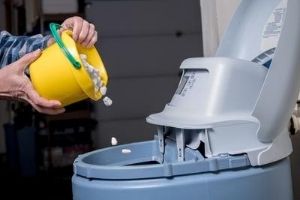Many homeowners don’t realize how important water softener is for their plumbing. If they’re battling hard water residue all over the sink, on faucets, and buildup in the plumbing, they could benefit greatly from a water softener.
The right type of water softener will remove these common issues and leave homeowners enjoying clean running water with no buildup and no residue.
Why Install a Water Softener

Installing a water softener comes with many benefits that homeowners will notice right away. Here are just some of the benefits homeowners can expect when installing a water softener:
- No more stains, spots, or hard water residue on appliances, shower or sink faucets, and washing machines.
- They’ll use less detergent in the washing machine and less soap in the shower.
- Appliances that use water will last longer.
- They’ll have softer hair and skin.
- They’ll have cleaner, sparkly dishes, and silverware.
The Upside and Downside of Salt-Based Water Softeners
All water softeners work by removing the hardness-causing minerals from their water through ion exchange. With salt-based water softeners, the water passes through a resin bed, exchanging hard minerals for sodium particles.

Salt-based water softeners remove the minerals that cause hard water spots. As a result, homeowners don’t have any hard minerals floating around in their plumbing or appliances. They’ll find that appliances work better and last longer since the hard minerals aren’t going through the systems. They should also experience fewer repairs and plumbing maintenance over the long-run since water that has hard minerals completely removed is better for the system.
On the downside, these water softeners are often more expensive than the salt-free options and require maintenance to clean out the resin bed. Homeowners will also need to refresh the salt within the system from time to time. The resin bed itself will need to be replaced every five to ten years depending on how much the system is used.
Upside and Downside of Salt-Free Water Softeners

These water softeners don’t use ion exchange to remove hard minerals. Instead, the minerals’ form is changed to a crystal that doesn’t stick to surfaces. The water is not truly “softened” but rather conditioned.
The benefit of this system is that it requires far less maintenance. The cost is often cheaper than a salt-based softener, and installation can be DIYed if desired. No sodium is added to the regular water intake, as well.
On the downside, this softener doesn’t remove the minerals from their water. In areas where water sits, like a water heater, they will still get a buildup of minerals. Homeowners still need to flush areas like the water heater to purge mineral buildup from time to time.
Exceptional, Quality Plumbers
Valley Plumbing and Drain Cleaning Proudly serve the communities in and around Lehi, UT with expert water softening services. They focus on providing customer education so homeowners are fully informed about their plumbing choices and solution.


